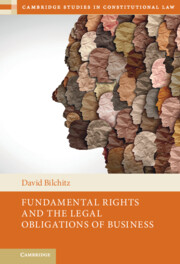Book contents
- Fundamental Rights and the Legal Obligations of Business
- Cambridge Studies in Constitutional Law
- Fundamental Rights and the Legal Obligations of Business
- Copyright page
- Dedication
- Contents
- Figures
- Tables
- Preface
- Acknowledgements
- Table of Cases
- Introduction The Question of Substantive Corporate Obligations for Fundamental Rights
- 1 The Nature and Purpose of the Corporation in Law
- Part I Legal Doctrinal Models for Addressing the Substantive Obligations of Non-State Actors for Fundamental Rights
- Part II Towards a Multi-Factoral Approach for Determining the Substantive Content of Corporate Obligations
- 6 The Justification for and Contours of a Multi-Factoral Approach
- 7 A Balancing Act – Proportionality in the Corporate Sphere
- 8 The Multi-Factoral Approach and Positive Obligations for Corporations
- Part III The Institutional Implications of the Multi-Factoral Approach
- Bibliography
- Index
8 - The Multi-Factoral Approach and Positive Obligations for Corporations
from Part II - Towards a Multi-Factoral Approach for Determining the Substantive Content of Corporate Obligations
Published online by Cambridge University Press: 29 October 2021
- Fundamental Rights and the Legal Obligations of Business
- Cambridge Studies in Constitutional Law
- Fundamental Rights and the Legal Obligations of Business
- Copyright page
- Dedication
- Contents
- Figures
- Tables
- Preface
- Acknowledgements
- Table of Cases
- Introduction The Question of Substantive Corporate Obligations for Fundamental Rights
- 1 The Nature and Purpose of the Corporation in Law
- Part I Legal Doctrinal Models for Addressing the Substantive Obligations of Non-State Actors for Fundamental Rights
- Part II Towards a Multi-Factoral Approach for Determining the Substantive Content of Corporate Obligations
- 6 The Justification for and Contours of a Multi-Factoral Approach
- 7 A Balancing Act – Proportionality in the Corporate Sphere
- 8 The Multi-Factoral Approach and Positive Obligations for Corporations
- Part III The Institutional Implications of the Multi-Factoral Approach
- Bibliography
- Index
Summary
This chapter considers the question of whether corporations have positive obligations in relation to fundamental rights and, if so, how to determine the substantive content of those obligations. The chapter examines justifications for the ‘negative obligations model’ which asserts that non-state actors only have negative obligations – to avoid harming – fundamental rights. I show why the negative/positive obligation distinction is not adequate to distinguish the obligations of the state from those of non-state actors and also provide positive justifications for why non-state actors and, particularly, corporations should have such obligations. The multi-factoral model, suitably modified, I argue complimented by a seven-step test – instead of proportionality – provides a structured analytical process for legally determining the substantive content of the positive obligations of corporations. Lastly, I consider the legal instantiation of positive obligations through the courts in South Africa and the legislature in India. The multi-factoral model, I suggest, could be helpful in systematising and guiding these developments.
Keywords
- Type
- Chapter
- Information
- Fundamental Rights and the Legal Obligations of Business , pp. 302 - 358Publisher: Cambridge University PressPrint publication year: 2021



